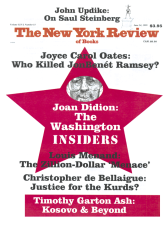In response to:
The Mysterious Mr. Wordsworth from the January 14, 1999 issue
To the Editors:
Anne Barton frames her review of my The Hidden Wordsworth: Poet, Lover, Rebel, Spy [NYR, January 14] in terms of the many things Wordsworth’s nineteenth-century admirers didn’t know about his life, but fails to acknowledge my explanation of Wordsworth’s successful “spin” on virtually every item in her list. She writes as if biography were simply a matter of facts, ignoring its necessary connections between speculation, conjecture, and interpretation; to paraphrase Blake, what are now facts were once only speculations.
This disjunction between fact and interpretation leads Barton to mistake my title adjective, “hidden,” as if it meant “unknown.” Nowhere do I claim that I am presenting materials unknown to most Wordsworth scholars—with the exception of the “spy” information. Instead, as an array of British reviewers appreciated, The Hidden Wordsworth sets out to unravel Wordsworth’s process of self-creation, showing how, by selective handling of the facts of his early life, he created the image of himself as “the chosen Son” in The Prelude, one of the most powerful autobiographical fictions in English—and thus one most in need of powerful interpretation.
Missing this point leads Barton to say that I “obviously” wanted to write “a strikingly ‘sensational”‘ biography (her scare quotes). No unbiased reader would characterize The Hidden Wordsworth as sensational. All its apparently “sensational” claims are documented—poet, lover, rebel, spy—and more than can be captured in my easy allusion to John le Carré’s Tinker, Tailor, Soldier, Spy. Not only documented but argued, with counter-evidence and alternative hypotheses, and informed speculation.
Failing to appreciate the value of strong interpretation, Barton distorts section after section of The Hidden Wordsworth. Regarding Wordsworth’s early sexual experiences, she chides me for “invent[ing] an entire short story” about his adventures on Lake Como in 1790, neglecting to point out that the “short story” is built up wholly of Wordsworthian texts: poems, drafts, fragments, letters, and journals by William, Dorothy, and Mary. She says it is “scarcely new,” but it is entirely new, because the point of the story is less Wordsworth’s sexual experience than how his “hiding” strategy works: the evidence often stares us in the face, but it requires interpretation and, yes, speculation to bring it into focus.
Barton’s lack of sympathy with my project is clearest in her dismissal of my account of Wordsworth’s clandestine trip to France in 1793. She acknowledges, as I do, that the possibility has been “entertained by all of Wordsworth’s recent biographers,” but neglects to cite my next sentence: “What remains to be done, since none of these authorities ventures beyond the positive evidence, is by a finer sifting of the evidence to construct a scenario for each possibility” (p. 359). That is, a scenario based on available facts. The risks are obvious, but the proper response would be to produce a more plausible scenario. Indeed, on this score I seem to have succeeded with Barton despite herself: “Any reader might be forgiven for coming away with the impression that all this actually happened, as opposed to being mere speculation.” Thanks, Anne—but not all speculation is “mere.”
On the “spy” business, Barton cannot imagine what Wordsworth could have been doing for Pitt’s secret service in Germany, ignoring my pages of reasoned suggestions. She cites Nick Roe to “indicate” that Wordsworth’s connections to the Secret Service “remain unclear,” completely overlooking my grateful use of Roe to provide further clarification. As with Wordsworth’s Como escapades, the spy business is more important as a confirmation of the “hidden” aspects of his self-creation than for any espionage work he did.
Barton is naturally more comfortable with facts than with interpretations, and I am grateful for her corrections of one mistake, two verbal slips, and one missing reference.
Ultimately Anne Barton’s review demonstrates the need for a book very much like The Hidden Wordsworth. She wants to insist that Wordsworth remains “stubbornly hidden.” I disagree, but ruefully recognizing that the stubbornness resides as much with readers who don’t want to change their minds as with the poet who so successfully “hid” his early development from posterity.
Kenneth R. Johnston
Department of English
Indiana University
Bloomington, Indiana
Anne Barton: replies:
I should have thought that my sympathy with “speculation, conjecture, and interpretation” in the writing of biography was amply attested to in my wholehearted admiration of the work of Richard Holmes [“Over the Dark River,” NYR, May 26, 1995]. Everything depends on how it is done. Kenneth Johnston is not Richard Holmes. I stand by the reservations I expressed in my review of The Hidden Wordsworth—and note with a degree of amusement that the word “scenario” as employed in Professor Johnston’s letter of protest occupies just that unhelpfully ambiguous and unstable position between hypothesis and fact that I find unsatisfactory in his book as a whole.
This Issue
June 24, 1999



